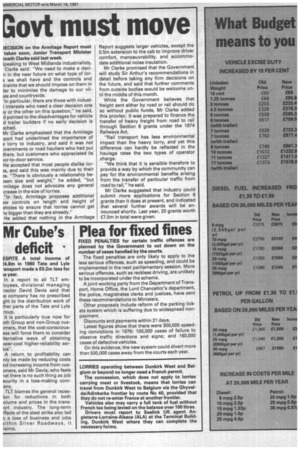Govt must move
Page 7

If you've noticed an error in this article please click here to report it so we can fix it.
MCISION on the Armitage Report must taken soon, Junior Transport Minister Ineth Clarke said last week.
;peaking to West Midlands industrialists, Clarke said: "We need to make a decin in the near future on what type of lors we shall have and the controls and Araints that we should impose on them in ler to minimise the damage to our viljes and countryside.
'In particular, there are those with indust1 interests who need a clear decision one iy or the other on this question," he said, d pointed to the disadvantages for vehicle d trailer builders if no early decision is ached.
Mr Clarke emphasised that the Armitage port had underlined the importance of e lorry to industry, and said it was not pvernments or road hauliers who had put there, but customers who appreciated its mr-to-door service.
He accepted that most people dislike lorBs, and said this was mainly due to their ze. "There is obviously a relationship bemen size and weight," he added, "but rmitage does not advocate any general crease in the size of lorries.
"In fact, Armitage proposes additional aw controls on length and height of 3hicles to ensure that lorries cannot get iy bigger than they are already."
He added that nothing in the Armitage Report suggests larger vehicles, except the 0.5m extension to the cab to improve driver comfort, manoeuvrability, and accommodate additional noise insulation.
Mr Clarke promised that the Government will study Sir Arthur's recommendations in detail before taking any firm decisions on the future, and said that further comments from outside bodies would be welcome until the middle of this month.
While the Government believes that freight sent either by road or rail should do so without public funds, Mr Clarke added this proviso: it was prepared to finance the transfer of heavy freight from road to rail through Section 8 grants under the 1974 Railways Act.
"Rail transport has less environmental impact than the heavy lorry, and yet this difference can hardly be reflected in the haulage rates the two types of operator charge.
"We think that it is sensible therefore to provide a way by which the community can pay for the environmental benefits arising from the transfer of particular traffic from road to rail," he said.
Mr Clarke suggested that industry could submit more applications for Section 8 grants than it does at present, and indicated that several further awards will be announced shortly. Last year, 20 grants worth £7.5m in total were given.




























































































